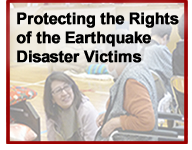Regarding the establishment of evacuation centres with due consideration of the various needs of residents, including those of women
Human Rights Now, 10 May 2011
It has been about two months since the Great East Japan Earthquake. A considerable number of people are living in evacuation centres and will continue to do so for some time. It is imperative that those people's human rights are protected and that due consideration is given to the needs of vulnerable people resident in the evacuation centres. In this regard, on 16 March, the Gender Equality Bureau of the Cabinet Office mapped out a policy, 'Concerning the response to the disaster from the perfectives of women and carers'. It requests the following to ensure that evacuation centres are run with due consideration for the needs of women:
1. Provide partitions to ensure privacy,
2. Provide changing rooms, nursing rooms and bathing facilities in which women need not worry about men's eyes,
3. Safe and separate toilets for women and men,
4. Designated areas for families with babies,
5. Ensure an accurate grasp of women's needs in the local support system,
6. Ensure women's participation in the operation system of evacuation centres,
7. Place opinion boxes at evacuation centres,
8. Implement counselling by female doctors, public health nurses, and female counsellors.
On 28 April, the Cabinet Office also published a document entitled, 'Concerning the provision of support in response to the various needs of victims'. Human Rights Now (HRN) believes that such requests by the Cabinet Office are a good, yet the issue remains whether the requests are being implemented in each evacuation centre. Over the past three weeks HRN conducted a fact-finding mission in three prefectures affected by the disaster and found that there are still many ill-equipped evacuation centres that have not accommodated the compelling needs of women. In many evacuation centres:
1. There are no 'partitions', changing rooms or nursing rooms for women, and little privacy is protected,
2. Toilets are dirty enough to hesitate to use, and temporary toilets are set up outside and therefore not safe,
3. It is still difficult to do laundry, little safe space is secured to hang out female laundry, women have little choice but to use their underwear once and throw it away, and the supply of underwear is limited.
4. Further, we can confirm that in some of the evacuation centres in which residents cook in kitchens, gender roles are being forcefully applied. Women are being coercively allocated to do the cooking, regardless of marital status or occupation, whilst men are not obliged to do so.
5. In many evacuation centres, women are not participating in the running of the centre.
6. It is also reported that in such situations various issues are being decided by area leaders who run the evacuation centres and women are being forced to keep silent. For example, the erection of partitions has been refused on the grounds that the partitions would harm the unity of communities, and female-specific requests have been rejected for the reason that the provision of skin lotion, for example, is luxurious.
7. The provision of opinion boxes at evacuation centres is not an effective means of assessing women's needs as women do not know who will read the comments, and therefore may not comment freely.
8. It turned out that there are only a few evacuation centres in which the civil sector is providing consultations for women. In many evacuation centres, it has been decided that offers of such consultations are not permitted, and in some evacuation centres even the distribution of flyers publicising telephone consultations for women, such as Purple Hotline, have been rejected.
This shows that circulars and notices issued by the central ministries are not being fully enforced in many of the ruined areas. While there are some places in which advanced policies have been adopted in accordance with government notices, in most of the ruined areas that is unfortunately not the case. It is difficult for women to change the situation by expressing their opinions since they are forced to be silent in the course of their ongoing life as evacuees. HRN requests that the government, particularly the Cabinet Office, fully enforce the implementation of its circulars and notices in the ruined areas, rather than just issuing them.
HRN calls on the Cabinet Office to take the following measures, if needed, in cooperation with staff from prefectural governments, local authorities and women's groups:
1. Inspect and grasp the gap between the notices issued and the current condition, as well as women's complaints and needs, by visiting evacuation centres in the ruined areas,
2. Post various notices thoroughly on bulletin boards in evacuation centres,
3. When staff from the authorities confirm the existence of problems in evacuation centres, consult the leaders of the evacuation centres and request that they improve the situation extemporarily,
4. Take necessary measures to notify all women affected by the disaster of the various counselling services available, and also establish a system capable of coping with the various problems being encountered by women in the ruined areas,
5. Further, as the Cabinet Office, constantly encourage staff in charge of gender equality in prefectural governments and local authorities to work on the abovementioned activities 1-4, monitor the status of implementation regularly, and implement cooperation and consultation on a daily basis in a careful manner,
6. As the central government, provide all support necessary for the abovementioned activities 1-4 so that staff from prefectural governments and local authorities can conduct such activities on a daily basis, and support the expansion of the system through various measures including the dispatch of staff from the Cabinet Office,
7. Interview women's groups and NPOs that support women in the ruined areas in a careful manner, and improve the situation in cooperation with civil groups.







